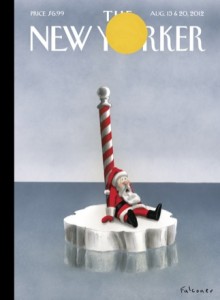August 13 & 20, 2012: “After Ellen” by Justin Taylor
Scott, who is kind of a jerk, packs up his car in Portland while composing a “dear John” note to his girlfriend, Ellen. He plans to leave it on the table and just disappear, leaving her without a car or a real explanation. He also turns off his phone and doesn’t answer her calls. He’s self-absorbed and rationalizing his behavior. By the time he gets to San Francisco, he stops. He stays in the Omni, using his parents’ credit card, which they finally notice. As I said, he’s a jerk.
Then he cashes in some of his trust fund (he has a trust fund?) to get an apartment, he steals a dog, and takes up with a woman he doesn’t really seem to think is a long term relationship for him. But the dog gives birth on his couch and . . . now everything’s different.
Really? Or maybe it’s not different, because except for his fondness for the dog and the puppies, he seems to be as big a jerk as ever. Maybe slightly less self-absorbed.
On the plus side, the story isn’t about kids or cancer or infidelity. The scenario is unusual and the perspective, from the jerk’s point of view, is refreshing. (It’s interesting that the author says he’s written about the same incident—based on something that happened to a friend—from the other side, but wanted to explore it from the side of the guy leaving.) On the negative side, the ending seemed premature. I like open-ended stories, but this one seemed to just stop.
The story is part of a new collection the author is working on, one with some overlapping characters and themes.


To me, the story seemed OK, until I read the Q&A and learned that the author he was friends with the Ellen-type character in a real life version of this.
I don’t think Taylor explored the jerk’s point of view at all. He presented Scott as a one-dimensional jerk, which is Ellen’s perspective and imagines Scott acting as such a jerk might act. There’s nothing necessarily wrong with that if Taylor would own up to the fact that he’s adopting Ellen’s perspective. A fiction writer is not required to be an impartial jury. But when the writer claims in an interview to have explored the other point of view, that changes everything.
How do we know Scott doesn’t have good reason for acting as he did? How did Ellen treat him during the course of their relationship? We don’t know. We got absolutely nothing of Scott’s perspective.
I rarely ever let author interviews color my views of a work, but the disconnect here is quite stark and not encouraging in what it says about Taylor’s ability to imagine a character who he doesn’t personally know. Sorry New Yorker; this does not make me want to read the rest of the upcoming collection.
I didn’t love this story; the “jerk” probably kept me at a distance–a wealthy commitment-phobic d.j.? I did appreciate the ending though. For me, it implied that the commitments he was avoiding will ultimately catch him, with differences of who and where. I enjoy your New Yorker story reviews–keep them coming!
I think it’s important to remember that the incident that caused Scott to run out on Ellen was their discussion of getting a dog. The dog represented a stable, long-term relationship, and Scott could see his whole life mapped out before him – the proposal and wedding and kids. When Scott ran off, it demonstrated his inability to accept responsibility and adulthood.
When Scott brings Yreka home, not knowing the dog is pregnant, Scott suddenly has responsibility thrust upon him. Without sounding overly cliché, I think the moral of the story is that life is what happens when you’re making plans, or simply, life happens. So we see a change in the character Scott because of the difference in the way that he reacted to getting a dog with Ellen, and his obvious affection for Yreka.
Ultimately, the reason I was disappointed with the story is that there didn’t seem to be a conflict or escalating tension throughout the story. Without tension, a story is just a set of disconnected occurrences, which is the way the story reads. For example, that whole section on Chinatown didn’t contribute to the story in any way. As a result, I never emotionally bought in.